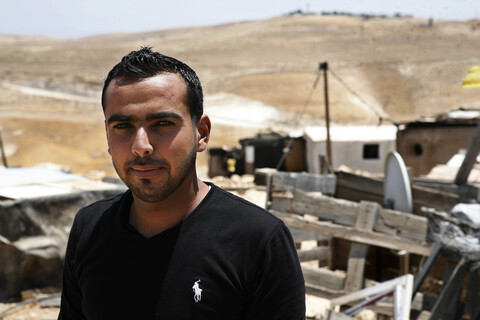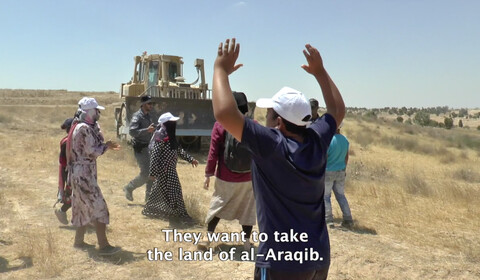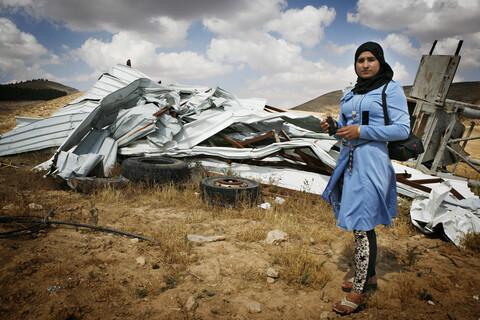The Electronic Intifada Abu Dis 26 February 2015

Israeli Border Police surround the gateway to a protest camp in Abu Dis in preparation for the eviction of activists. The camp was established at the beginning of February.
Israeli Border Police have repeatedly demolished the Gateway to Jerusalem protest camp. But Palestinian activists say they are undeterred.
Bringing together activists, Palestinian Authority officials, residents of the Jerusalem suburb Abu Dis and the local Bedouin communities, the camp was built to protest Israel’s de facto annexation plan for what it calls the East 1 (E1) corridor connecting Jerusalem and the Maale Adumim settlement block in the occupied West Bank.
“We built this camp at the beginning of February,” Adel Salah, mayor of Abu Dis, explained. “We saw Israeli bulldozers preparing this land for construction and we knew we had to do something. They act like it is Israeli land but it has never been.”
Successive Israeli governments have prioritized the securing of the E1 corridor to consolidate its control of the area around Jerusalem, but budgetary constraints and international pressure have prevented the land grab’s completion.
Prime Minister Benjamin Netanyahu’s government retaliated against the United Nations General Assembly’s 2012 decision to grant the Palestinian Authority observer state status by announcing that it would push ahead with the construction of up to 4,000 housing units and ten hotels in the corridor.
The construction would split the West Bank in two, making it even more difficult for Palestinians, whose freedom of movement is already severely restricted, to travel from the north to the south.
Forcible transfer
Clearing the E1 corridor of Palestinians is a prerequisite for the implementation of the Israeli government’s plan.
Abu Dis used to be a suburb within easy reach of Jerusalem but following the construction of Israel’s wall about ten years ago it was cut off from the city. Israel has declared a tract of Abu Dis’ land as the relocation site for some of the eighteen Bedouin communities in the E1 corridor which the government plans to forcibly transfer.
The Abu Dis land in question was recently declared a military zone to deter the protest camp activists from returning.
“But this is not a military area,” the mayor stressed. “This land belongs to many people in Abu Dis; it is private Palestinian land.”
The unilateral Israeli plan to forcibly transfer the Bedouin Jahalin community to this land is rejected by both the mayor and Bedouins alike.
“This land belongs to someone else,” a man named Daoud from the Jahalin community said at the protest camp. “We don’t want to create problems.”
“If we must move, then let us return to Bir al-Saba, that is where we are from,” he said referring to the historic Palestinian city in the Naqab (Negev) desert which was ethnically cleansed during the establishment of Israel in 1948 and the government renamed Beer Sheva.
Unity
The E1 scheme is only the latest chapter in Israel’s repeated history of forcing Palestinian Bedouins off of their land.
“When will it end?” asked Daoud.
As Border Police surrounded the camp last Monday, activists built new structures and emphasized unity in the face of Israeli land theft and attempts to pit Palestinian communities against each other.
Border Police suddenly stormed the gathering to disperse the camp. As tear gas and stun grenades fell on the site, protesters ran towards the valley or into Abu Dis, chased by more tear gas.
Once the camp was emptied, the metal and wooden structures sheltering the activists were dismantled by Border Police and loaded onto a truck, and a bulldozer once again began to construct the housing units intended for the Jahalin community.
“No matter,” Jamal Abu Hillal said. “As soon as they leave, we will rebuild.”
Silvia Boarini is a photojournalist based in Bir al-Saba and is currently working on a documentary on Naqab Bedouins.
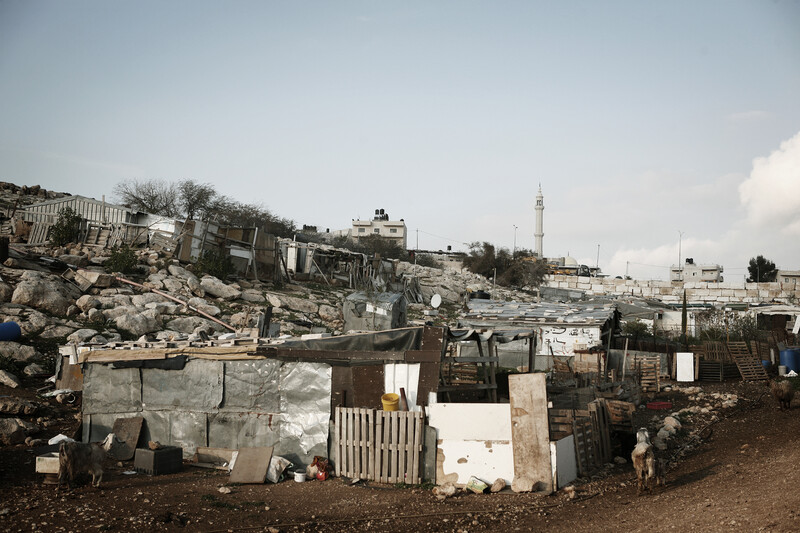
One of the many Bedouin encampments in the area, located just below the protest camp. Its inhabitants were attacked with tear gas for much of the morning.

Mahmud, 25, belongs to the Bedouin Jahalin community. “I joined the protest, we are all together, we don’t want to move onto someone else’s land.”
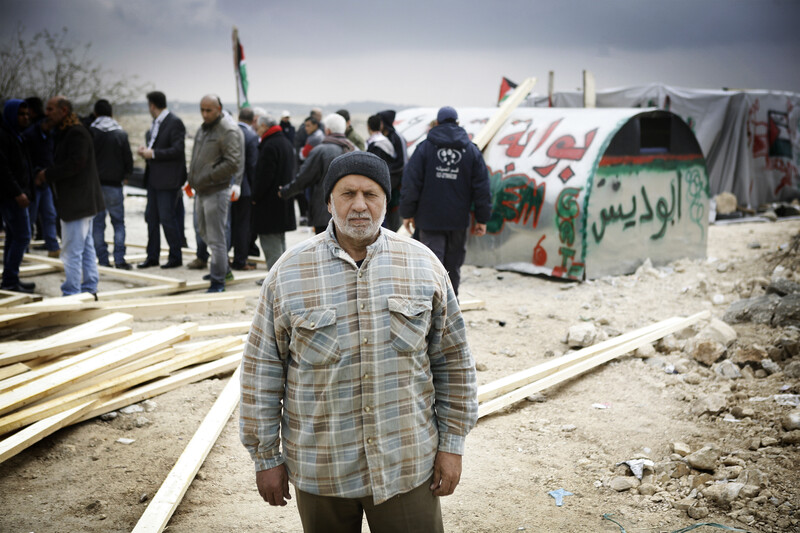
Nabeel Abdullah, 67, is from Abu Dis. “I came [to the protest camp] because Israel is taking our land. We all need to come down here and stand together to defend it.”

Activists erect more wooden structures as Israeli Border Police prepare to dismantle the camp for the sixth time.

Daoud is a Bedouin from the Arab Jahalin tribe. He lives in nearby Jabal al-Baba and the E1 plan would see his community forcibly displaced to Abu Dis. “We are from Bir al-Saba. If we must be moved, then we want to return there,” he said, referring to the ethnically cleansed Palestinian town in the Naqab (Negev) desert.

Thaer Anees is a coordinator for the Jerusalem branch of the Popular Resistance Committee. “The E1 plan will remove Palestinian communities from around Jerusalem and will destroy the Bedouin lifestyle. We must resist this,” he said.

Protesters warm up around one of the fires lit for warmth at the camp.

Afaf Farun, 31, is a teacher and political activist. “This is our home and we must defend it,” she said.

Hajj Atta, 70, is from Abu Dis and owns a portion of the land the Israeli government has slated for the forcible transfer of Bedouins from the E1 tract.
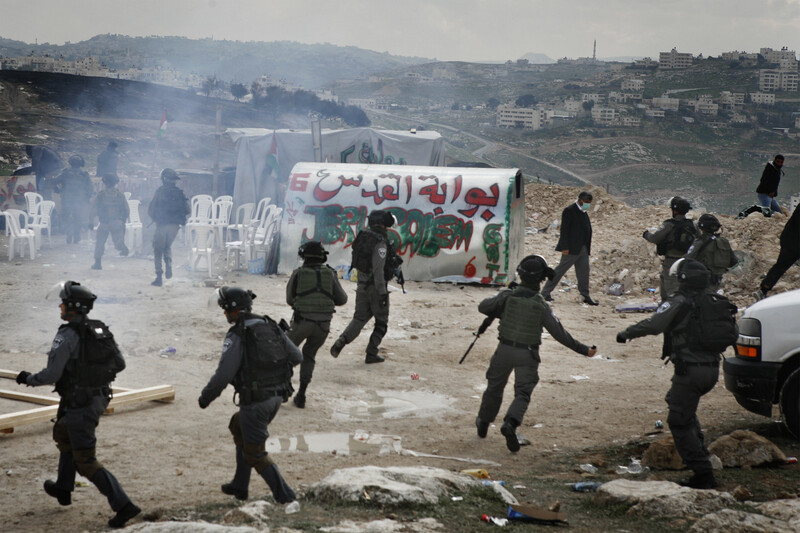
Israeli Border Police raid the camp using stun grenades and tear gas.

Israeli Border Police charge at Sultan Abu al-Eineen. Abu al-Eineen coordinates between the Palestinian Authority and civil society organizations.
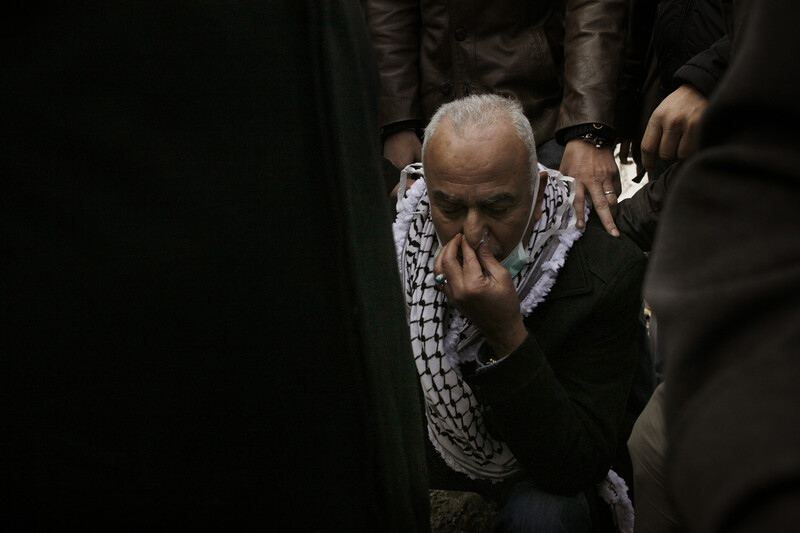
Sultan Abu al-Eineen suffers the effects of tear gas inhalation.

Israeli Border Police lead away one of the four protesters they arrested that day.

Palestinian legislator Dr. Mustafa Barghouti checks Hajj Atta’s pulse after he fell during a heated argument with Israeli soldiers.

After Border Police dispersed protesters towards the nearby hills, workers came in to dismantle the camp.

A crane lifts one of the tin shacks that made up the Gateway to Jerusalem camp. Activists vowed to rebuild.
